Looking for the best SEO management tools to help streamline your efforts?
Managing SEO for multiple clients is no walk in the park. Between audits, content strategy, reporting, and keeping up with algorithm updates, it’s easy to feel overwhelmed.
I’ve been there. Early on, I was juggling spreadsheets, browser extensions, and free tools that didn’t talk to each other. That worked—until it didn’t. Once I started managing SEO for multiple sites, I knew I needed a better system.
That’s where SEO management tools come in. Whether you’re a freelancer, part of an agency, or running SEO for your own brand, the right tools can save you hours and help deliver better results.
In this post, I’ll walk you through the best SEO management tools, including the one I personally recommend for agencies.
In This Article
- What Are SEO Management Tools?
- The 8 Best SEO Management Tools: Expert Picks
- How I Chose The Top 8 Tools
- 1. All in One SEO (AIOSEO): Best All-in-One SEO Management Tool for Agencies
- 2. SEOBoost: Best for Content Management
- 3. Asana: Project Management for SEO Teams
- 4. Semrush: Best for Competitive Analysis
- 5. Notion: All-in-One Workspace for SEO Teams
- 6. Ahrefs: Best for Backlink Management
- 7. CoSchedule: SEO Content Calendar and Management
- 8. Screaming Frog: Best for Technical SEO Audits
- The Best SEO Management Tools: My Top Picks
- SEO Management Tools: Your FAQs Answered
What Are SEO Management Tools?
An SEO management tool is software that helps you plan, track, and improve your website’s search engine performance. Instead of juggling spreadsheets, browser plugins, and five different platforms, these tools bring everything under one roof. They save time, reduce errors, and help you make smarter decisions based on real data.
From checking technical SEO issues to tracking keyword rankings and building white-label reports for clients, SEO tools help you:
- Audit websites and fix problems that hurt rankings.
- Research keywords and monitor how they perform over time.
- Analyze competitors to find new content and link opportunities.
- Create and automate reports that are easy to share with clients or your team.
Whether you're working solo or managing dozens of client sites, a good SEO tool acts like your behind-the-scenes assistant—always working to boost your visibility in search.
Why Use SEO Management Tools?
SEO isn’t a one-and-done task. It involves technical fixes, ongoing optimizations, performance monitoring, and strategy shifts. Managing all that manually just isn’t scalable, especially when you’re responsible for multiple websites.
Here’s what the right SEO management tool can do:
- Centralize tasks: On-page SEO, audits, keyword tracking, and reporting all in one place.
- Streamline workflows: Collaborate with your team or clients without confusion.
- Scale efficiently: Onboard new clients quickly using templates or settings import/export.
- Automate reporting: Impress clients with clean, timely white-label reports.
With that being said, let’s dive into the top SEO management tools.
The 8 Best SEO Management Tools: Expert Picks
Before finalizing my recommendations, I tested over 15 different SEO management tools. These ranged from popular all-in-one platforms to niche software designed for very specific SEO tasks.
How I Chose The Top 8 Tools
During testing, I looked for tools that could:
- Save time by consolidating multiple SEO functions in one place.
- Scale well for agencies and teams managing multiple sites.
- Integrate smoothly with existing workflows.
- Provide clear, actionable data rather than overwhelming you with vanity metrics.
- Offer solid value for the price, especially for growing agencies.
After weeks of hands-on use, I shortlisted the 8 tools in this post because they consistently delivered on performance, ease of use, and ROI—whether I was running a one-site project or managing a full client roster.
1. All in One SEO (AIOSEO): Best All-in-One SEO Management Tool for Agencies
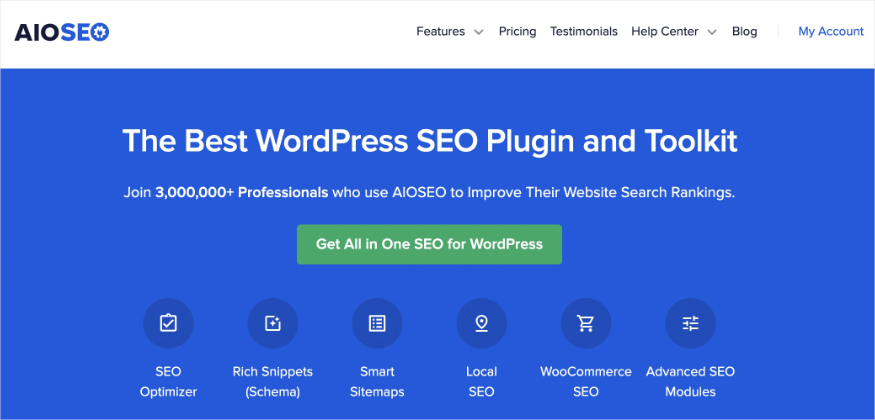
AIOSEO is the best SEO management tool for boosting your online visibility. It’s a powerful, easy-to-use SEO plugin with over 3 million active users. Many of those are agency owners who manage hundreds of sites. That’s because the plugin covers everything from technical SEO audits to schema markup, and everything in-between.
Regarding SEO management, AIOSEO’s agency features are a lifesaver when you’re juggling multiple projects. I’ve used it to streamline onboarding, generate SEO reports, and keep SEO settings consistent across client sites.
Forget logging in and out of individual WordPress installs. AIOSEO streamlines this process, saving invaluable agency time. AIOSEO’s centralized approach extends to essential tasks like:
Managing License Activations
Once AIOSEO is installed, managing your license across multiple sites is simple with the Domains Activations box. Just head to AIOSEO » Network Settings to activate or deactivate your license as needed.

From this central dashboard, you can manage your AIOSEO license on any subsite in your WordPress multisite network with just one click.
Import and Export SEO Settings
If you manage multiple WordPress sites (especially as an agency), you’ll love AIOSEO’s Import/Export Settings. Setting up SEO across a network can be tedious, but this tool saves you time by letting you copy SEO settings from one site to another in just a few clicks.
To access it, head to Network Tools » Import/Export.
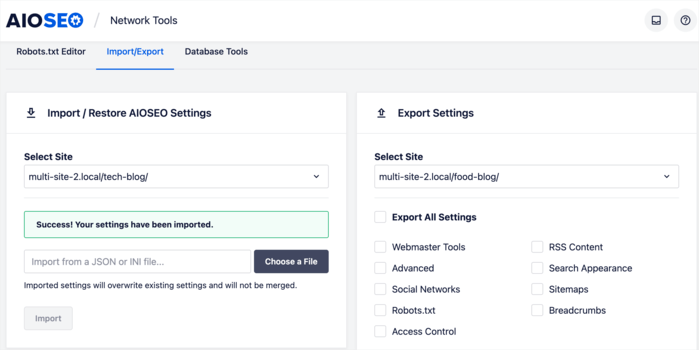
You can download SEO settings from one site and upload them to another, or even multiple sites at once. One feature I especially love is the ability to import settings from other SEO plugins, making migration a breeze.
Adding a new site to your multisite network? You can quickly apply existing SEO settings by importing them from an already optimized site. Just add the new site as usual, then choose the source site to pull the settings from.
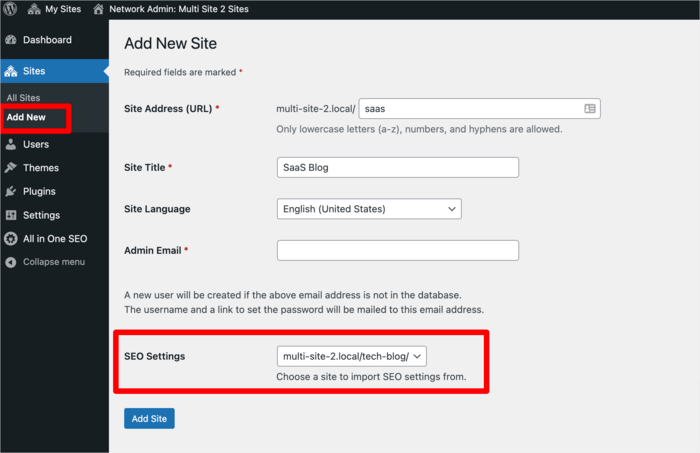
This helps speed up the process of setting up new sites, enabling you to rank faster, even for your new sites.
Edit and Manage Robots.txt Files
Controlling how search engines crawl your site is essential for getting key pages indexed. That directly boosts your clients’ chances of ranking on search engines. That’s why optimizing the robots.txt file is such a crucial part of SEO.
But managing this across a multisite network? That can get overwhelming fast.
This is where AIOSEO really shines as an SEO management tool. It lets you easily edit the robots.txt file for every subsite in your network, whether you’re handling them one by one or making batch updates.
To get started, go to Network Admin Dashboard » AIOSEO Dashboard » Network Tools.
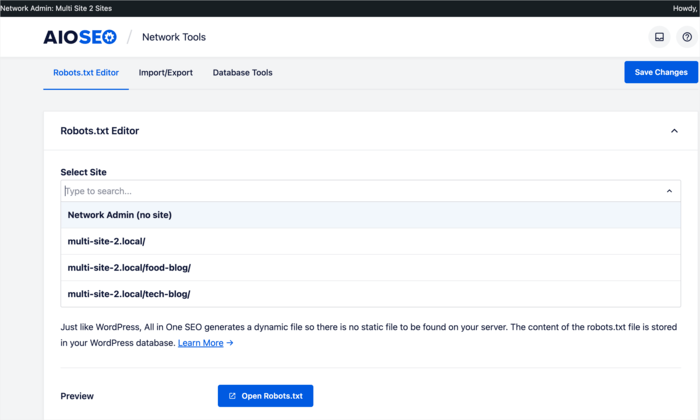
Next, select a site, and you will instantly see a preview of its robots.txt file. You can also change the robots.txt rules for that site right from the network admin area.

Additionally, you can also set network-wide rules that apply to all subsites by selecting the Network Admin (No Site) option. This lets you block unwanted crawlers and prevent search engines from indexing internal search URLs. Doing so gives you tighter control over how your entire network of sites is crawled.

Managing robots.txt files from one central location gives you more control while saving time and effort. With AIOSEO’s Network Tools page, handling this is simple and efficient, even across dozens of client sites.
SEO Reporting
One of the things that makes AIOSEO stand out for agency work is its SEO reporting system. I don’t have to mess with complicated spreadsheets or third-party tools. Instead, AIOSEO’s built-in Email Reports feature does all the heavy lifting for me.
I can schedule automatic reports that show clients exactly what’s going on with their site, from traffic trends to SEO health scores. The layout is simple, showing important SEO stats like search impressions, crawl issues, and optimization scores.
With AIOSEO’s reporting, I spend less time explaining SEO and more time proving it's working.
Other SEO Management Features
The multisite feature is just one of many reasons AIOSEO is one of the best SEO management tools for agencies. Other powerful features include:
- Search Statistics: Get insights into your search performance right inside your WordPress dashboard.
- Link Assistant: Powerful internal linking tool that automates building links between pages on your site. It also gives you an audit of outbound links.
- Keyword Rank Tracker: Helps me easily track keyword rankings for the sites I manage, right from my WordPress dashboard.
- SEO Revisions: This feature lets you track how your changes impact SEO over time. It has saved me more than once when a client asked, “What changed last week?”
- Site Audits: Easily spot issues hurting your SEO and get actionable steps to fix them.
- User Role Management: AIOSEO’s Access Control lets you set precise permissions for every user. This ensures your SEO settings stay secure while teams work efficiently.
- And more
So, if you’re looking for the best SEO management tool for managing SEO on multiple sites, AIOSEO is it.
Pricing: Paid plans start at $49.60/year for 1 site. The Elite Plan has a $299.60/year price tag and supports 100 sites.
Managing more than a hundred sites?
Reach out to the AIOSEO team for a custom plan.
2. SEOBoost: Best for Content Management

SEOBoost is the best SEO management tool for overseeing content creation. Many small businesses and agencies trust it for all things content, including:
- Content planning and topic research
- Creating content briefs
- Content optimization
- And more
As an all-in-one content management platform, SEOBoost eliminates the need to juggle multiple tools, thereby streamlining your entire content optimization process. That’s what makes it such a powerful asset for building effective SEO content strategies.
SEOBoost even includes a content audit feature that scans existing content and recommends targeted improvements. This makes it easier to run high-impact campaigns for yourself or your clients.
You can easily integrate SEOBoost into your workflow in several ways. I use its keyword research tools to shape content strategies and rely on its optimization features to boost the quality and search performance of client content.
Content is a vital part of SEO, making its management an important part of your SEO strategy. And SEOBoost is the best tool to help you do that.
Pricing: SEOBoost offers a free demo and a 14-day free trial. Paid plans start at $27/month.
3. Asana: Project Management for SEO Teams

When I need to stay organized across multiple SEO projects, Asana is the first tool I turn to. It helps me break down big SEO goals into smaller, trackable tasks. Examples of said tasks include fixing broken links, publishing blog content, or preparing client reports. The timeline and calendar views keep my team aligned, especially during busy seasons with multiple campaigns running at once.
Here’s how I use Asana for SEO management:
- Project Templates: I set up templates for common workflows like SEO audits, content production, and technical fixes.
- Task Assignments: Everyone knows what they’re responsible for, and deadlines are easy to track.
- Comments and Attachments: My team can share Google Docs, screenshots, and notes without jumping between tools.
- Progress Tracking: I can quickly spot what’s falling behind and reassign work before things go off track.
Asana helps me stay ahead of deadlines and keeps SEO moving smoothly, even with a remote or distributed team.
Pricing: Free for small teams. Paid plans start at $10.99/month/user.
4. Semrush: Best for Competitive Analysis

Semrush is my go-to SEO management tool for SEO competitor analysis. It gives me a clear picture of which keywords are working for my competitors, how their content performs, and where their traffic is coming from. This helps me build better content plans and find SEO gaps I can take advantage of. Instead of guessing what might work, I use real data to guide every move.
Regarding SEO management, I use Semrush for:
- Competitor keyword research: I can enter a competitor’s domain and instantly see which search terms bring them traffic. This is great for finding keyword ideas I might’ve missed.
- Backlink analysis: It shows me who’s linking to my competitors and how strong those links are, so I can target similar opportunities.
- Site audits: I run detailed audits to find crawl issues, broken links, or missing tags that could be hurting SEO performance.
- Position tracking: This tracks how my pages rank over time for specific keywords, which is key for reporting wins to clients.
Semrush helps me stay one step ahead. It’s not just about what I’m doing. It’s also about what my competitors are doing, too.
Pricing: Paid plans start at $139.95/month.
5. Notion: All-in-One Workspace for SEO Teams
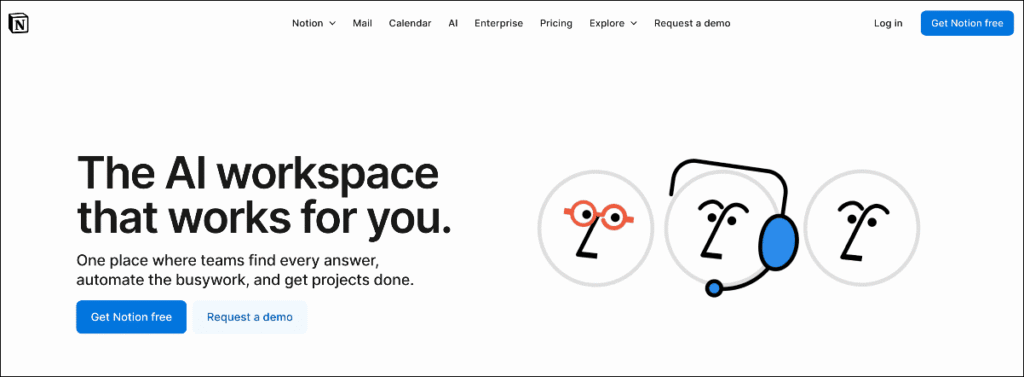
Notion is where I plan strategy, store SEO SOPs, and build out content calendars—all in one clean, flexible workspace. It’s a great SEO management tool for building a central SEO hub where my team can find everything they need.
I use Notion for:
- Content calendars: I build tables that track keyword targets, writers, deadlines, and publishing status.
- SEO strategy docs: From site structure ideas to backlink plans, everything’s documented and shareable.
- Custom dashboards: I build views tailored for team leads, writers, or developers—so everyone sees what matters most.
- Collaboration: My team can comment, tag each other, and update in real time.
Tired of scattered Google Docs and spreadsheets? Notion brings everything together in one place.
Pricing: Paid plans start at $8/month/user.
6. Ahrefs: Best for Backlink Management

When it’s time to build links, I switch to Ahrefs. It has one of the biggest backlink databases out there, which means I can see exactly who’s linking to what—and why. I rely on it to spot broken link opportunities, monitor my own link growth, and reverse-engineer my competitors’ link-building strategies. It makes link outreach a lot more targeted and effective.
Here’s what I find most helpful:
- Site explorer: I plug in any URL and see a full breakdown of their backlinks, top pages, and referring domains.
- Content gap tool: This tool compares my site to others and shows me which keywords they rank for that I don’t, so I know what content to create next.
- Broken link checker: I use this to find broken outbound links on other websites, then pitch my own content as a replacement.
- Rank tracker: I keep tabs on how my rankings change over time, especially after link-building campaigns.
With Ahrefs, I’m not just building links, I’m building authority and tracking the results as I go.
Pricing: Paid plans start at $129/month.
7. CoSchedule: SEO Content Calendar and Management

CoSchedule is built for content teams, and it fits perfectly into my SEO process. It helps me plan, schedule, and publish blog posts without missing deadlines or repeating topics. The best part? Everything is tied to a calendar view, so I can see my entire content strategy at a glance.
When it comes to SEO management, here’s how I use CoSchedule:
- SEO content calendar: I organize upcoming blog posts by topic, keyword, and publish date.
- Headline analyzer: This built-in tool helps me write stronger, more clickable titles (great for SEO + engagement).
- Task templates: I use pre-built workflows to move content from draft to published without skipping a step.
- Team collaboration: Writers, editors, and designers can all work from the same platform.
If your SEO strategy relies heavily on content, CoSchedule is another content management tool that makes your publishing process smooth and scalable.
Pricing: Paid plans start at $29/month.
8. Screaming Frog: Best for Technical SEO Audits

Screaming Frog is the best SEO management tool for running technical SEO audits. It’s a desktop crawler that scans every page on your site and mimics how search engines see it. I use it to catch things that other tools often miss. Examples include redirect loops, broken images, or duplicate content. It’s perfect for complex websites or during site migrations when every detail matters.
Here’s how I use it:
- Crawl reports: After a crawl, I get a full list of SEO issues like broken links, missing meta tags, or duplicate headings.
- Redirect mapping: This helps me find long redirect chains and loops that can waste crawl budget and slow down pages.
- Sitemap generation: I can build clean XML sitemaps directly in the tool—handy after restructuring a site or launching new content.
- JavaScript rendering: Screaming Frog can crawl JavaScript-heavy pages, which is crucial for modern websites built with React or Vue.
SEO management involves keeping websites technically sound. And Screaming Frog gives you everything you need to catch and fix problems early.
Pricing: Free version crawls up to 500 URLs per domain. Paid plans start at $279/year.
The Best SEO Management Tools: My Top Picks
The best SEO management tool for WordPress users is AIOSEO. I love that the plugin makes it almost effortless to handle SEO tasks for single or multiple sites. It also sends automated SEO reports straight to my inbox (or clients’ inboxes).
Other SEO management tools that rank in my top 3 are SEOBoost for content management and Asana for project management.
I hope this post helped you discover the best SEO management tools for your needs. You may also want to check out other articles on our tutorial on checking blog stats in WordPress or my list of the best social media post generators.
If you found this article helpful, then please subscribe to our YouTube Channel. You’ll find many more helpful tutorials there. You can also follow us on X (Twitter), LinkedIn, or Facebook to stay in the loop.
SEO Management Tools: Your FAQs Answered
What is SEO management?
SEO management is the ongoing process of improving your website and content to rank higher in search engine results. It involves key tasks like keyword research, content planning, on-page and technical optimization, link building, and performance tracking.
What are SEO management tools?
SEO management tools help streamline and scale your SEO efforts by automating tasks like keyword tracking, content workflows, audits, and team collaboration.
Why use SEO management tools?
SEO is an ongoing process that includes technical fixes, content updates, and performance tracking. This makes it hard to manage manually, especially across multiple sites. The right SEO management tool helps centralize tasks, streamline teamwork, and scale your efforts with ease.
Disclosure: Our content is reader-supported. This means if you click on some of our links, then we may earn a commission. We only recommend products that we believe will add value to our readers.

